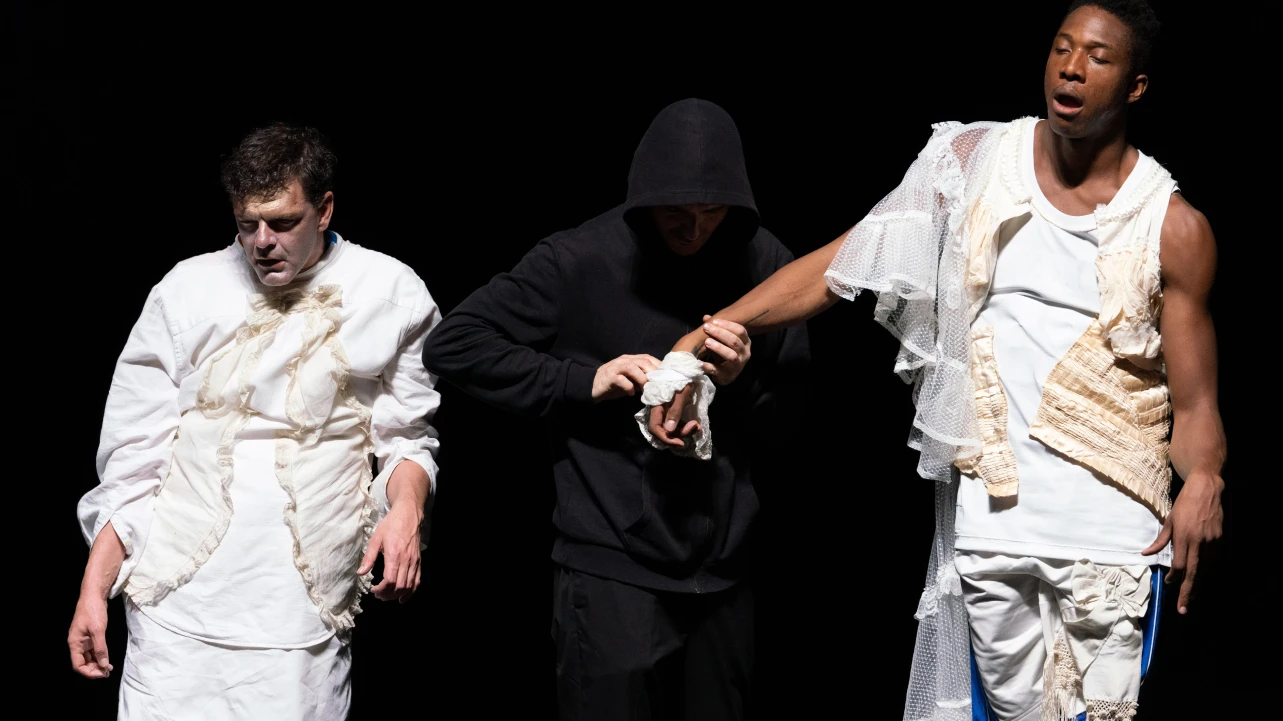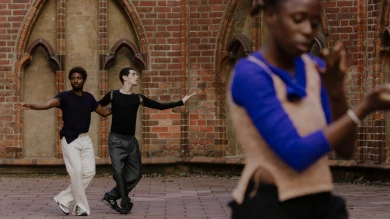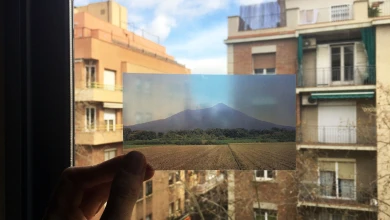Collective Mourning and Planetary Mourning. MONUMENT 0.6: Heterochrony
Eszter Salamon

Held on 11 Nov 2022
Collective Mourning and Planetary Mourning’s live arts programme is held in conjunction with the Community of Madrid’s 40th Autumn Festival and features the screening of the stage piece MONUMENT 0.6: Heterochrony, by Eszter Salamon, and the performance of Alex Baczyński-Jenkins’s dance piece Unending love, or love dies, on repeat like it’s endless. The project occasions experimentation with a sensitive approach to choreographic pieces and other physical practices which contend with different states of transit between life and death: the multiple and complex forms of mutual care; support for different states of mind stemming from loss; the invention of our own corporal or symbolic ritualisms which, upon being shared, resignify and establish new relational forms with life; and, finally, mourning as a state for perception and listening.
Hungarian choreographer Eszter Salamon has been working on her Monuments series since 2014, a long-haul investigation which brings together, in the present day, eleven pieces in different formats, scales and textures. Through the series, Salamon sets forth an enquiry into the relationships between choreography and history — official and non-official — from different angles and, as a result, sets up a zone of study, physical experimentation and choreographic production. She assumes that the body, in the way it relates, establishes common movements and becomes formed in techniques and disciplines of order or disobedience, is a place from which to also read and listen to history.
In this instance, the stage piece MONUMENT 0.6: Heterochrony is screened as we witness Salamon delve into the collectiveness of states of mourning and their transformative potential. A multi-voiced work which imagines a continuum between life and death, the co-existence of the living and the dead, and invents a utopian body: a dancing, acoustic body. The film joins echoes of archives of popular Sicilian music with choreographic impressions inspired by the mummification and conservation rituals of the Capuchin Catacombs of Palermo. It shows the details present in relations of proximity and intimacy between bodies, while also amplifying the sound dimension of the original stage piece, inviting spectators to become submerged in an imaginary sphere which juxtaposes the present time with traces of historical figures and place to, in Salamon’s words, “resist the abyss by means of casting memory through fiction”.
The screening will be followed by an encounter between the artist, Isabel de Naverán and Germán Labrador.
The activity looks to kindle a reflection around the possibility of experiencing mourning through life destroyed on Earth. And under the premise that, to this effect, there is firstly a need to experience caring for the sick body and mourning not simply as something purely individual.
[dropdown]
Eszter Salamon is a choreographer, artist and performer who lives and works between Berlin, Paris and Budapest and is a PhD Research Fellow at KHiO, the Oslo National Academy of the Arts. Her work evolves in different formats, aesthetics, methodologies and poetics, and in her practice Salamon deploys choreography as an activating and organisational agent with different methods such as image, sound, text, voice, the movement of bodies and actions. In 2019, she was awarded the Evens Art Prize and in 2020 was one of the artists selected inside the framework of the call La vie bonne of AWARE - Archives of Women Artists, Research and Exhibitions and the Centre national des arts plastiques (Cnap), France.
Germán Labrador has been the director of the Museo Reina Sofía’s Public Activities Department since 2021.
Isabel de Naverán is a dance researcher and since 2017 has been in charge of curating live arts in the Museo Reina Sofía’s Public Activities Department.
[/dropdown]
Credits
[dropdown]
Concept and artistic and choreographic direction:Eszter SalamonChoreography and performance:Matteo Bambi, Mario Barrantes Espinoza, Krisztiàn Gergye, Domokos Kovàcs, Csilla Nagy, Olivier Normand, Ayşe Orhon, Corey Scott-Gilbert and Jessica SimetTexts:Eszter Salamon, Elodie Perrin and Paul ÉluardMusic research:Eszter Salamon and Johanna PeineVoice work assistants:Johanna Peine and Ignacio JarquinMusical direction and arrangement:Ignacio JarquinDramaturgical support:Bojana CvejićRehearsal assistant:Christine De SmedtLighting design:Sylvie GarotSound:Marius Kirch and Felicitas HeckWardrobe design:Flavin BlankaTechnical direction:Matteo BambiProduction:Botschaft GbR/ Alexandra Wellensiek, Studio E.S/ Elodie PerrinFilming:César Vayssié
[/dropdown]
Organised by
Museo Reina Sofía
Collaboration
The Community of Madrid’s Autumn Festival
Inside the framework of
TIZ 5. Phantasmata and TIZ 6. Planet A: Green World
Participants
Participants
Más actividades
![Tracey Rose, The Black Sun Black Star and Moon [La luna estrella negro y negro sol], 2014.](https://recursos.museoreinasofia.es/styles/small_landscape/public/Obra/AD07091_2.jpg.webp)
On Black Study: Towards a Black Poethics of Contamination
Monday 27, Tuesday 28 and Wednesday 29 of April, 2026 – 16:00 h
The seminar On Black Study: Towards a Black Poethics of Contamination proposes Black Study as a critical and methodological practice that has emerged in and against racial capitalism, colonial modernity and institutional capture. Framed through what the invited researcher and practitioner Ishy Pryce-Parchment terms a Black poethics of contamination, the seminar considers what it might mean to think Blackness (and therefore Black Study) as contagious, diffuse and spreadable matter. To do so, it enacts a constellation of diasporic methodologies and black aesthetic practices that harbor “contamination” -ideas that travel through texts, geographies, bodies and histories- as a method and as a condition.
If Blackness enters Western modernity from the position of the Middle Passage and its afterlives, it also names a condition from which alternative modes of being, knowing and relating are continually forged. From within this errant boundarylessness, Black creative-intellectual practice unfolds as what might be called a history of touches: transmissions, residues and socialities that unsettle the fantasy of pure or self-contained knowledge.
Situated within Black radical aesthetics, Black feminist theory and diasporic poetics, the seminar traces a genealogy of Black Study not as an object of analysis but as methodological propositions that continue to shape contemporary aesthetic and political life. Against mastery as the horizon of study, the group shifts attention from what we know to how we know. It foregrounds creative Black methodological practices—fahima ife’s anindex (via Fred Moten), Katherine McKittrick’s expansive use of the footnote, citation as relational and loving labour, the aesthetics of Black miscellanea, and Christina Sharpe’s practices of annotation—as procedures that disorganise dominant regimes of knowledge. In this sense, Black Study is approached not as a discrete academic field but as a feel for knowing and knowledge: a constellation of insurgent practices—reading, gathering, listening, annotating, refusing, world-making—that operate both within and beyond the university.
The study sessions propose to experiment with form in order to embrace how ‘black people have always used interdisciplinary methodologies to explain, explore, and story the world.’ Through engagements with thinkers and practitioners such as Katherine McKittrick, C.L.R. James, Sylvia Wynter, Christina Sharpe, Fred Moten, Tina Campt, Hilton Als, John Akomfrah, fahima ife and Dionne Brand, we ask: What might it mean to study together, incompletely and without recourse to individuation? How might aesthetic practice function as a poethical intervention in the ongoing work of what Sylvia Wynter calls the practice of doing humanness?

Intergenerationality
Thursday, 9 April 2026 – 5:30pm
This series is organised by equipoMotor, a group of teenagers, young people and older people who have participated in the Museo Reina Sofía’s previous community education projects, and is structured around four themed blocks that pivot on the monstrous.
The third session gazes at film as a place from which to dismantle the idea of one sole history and one sole time. From a decolonial and queer perspective, it explores films which break the straight line of past-present-future, which mix memories, slow progress and leave space for rhythms which customarily make no room for official accounts. Here the images open cracks through which bodies, voices and affects appear, disrupting archive and questioning who narrates, and from where and for whom. The proposal is at once simple and ambitious: use film to imagine other modes of remembering, belonging and projecting futures we have not yet been able to live.

Remedios Zafra
Thursday March 19, 2026 - 19:00 h
The José Luis Brea Chair, dedicated to reflecting on the image and the epistemology of visuality in contemporary culture, opens its program with an inaugural lecture by essayist and thinker Remedios Zafra.
“That the contemporary antifeminist upsurge is constructed as an anti-intellectual drive is no coincidence; the two feed into one another. To advance a reactionary discourse that defends inequality, it is necessary to challenge gender studies and gender-equality policies, but also to devalue the very foundations of knowledge in which these have been most intensely developed over recent decades—while also undermining their institutional support: universities, art and research centers, and academic culture.
Feminism has been deeply linked to the affirmation of the most committed humanist thought. Periods of enlightenment and moments of transition toward more just social forms—sustained by education—have been when feminist demands have emerged most strongly. Awareness and achievements in equality increase when education plays a leading social role; thus, devaluing intellectual work also contributes to harming feminism, and vice versa, insofar as the bond between knowledge and feminism is not only conceptual and historical, but also intimate and political.
Today, antifeminism is used globally as the symbolic adhesive of far-right movements, in parallel with the devaluation of forms of knowledge emerging from the university and from science—mistreated by hoaxes and disinformation on social networks and through the spectacularization of life mediated by screens. These are consequences bound up with the primacy of a scopic value that for some time has been denigrating thought and positioning what is most seen as what is most valuable within the normalized mediation of technology. This inertia coexists with techno-libertarian proclamations that reactivate a patriarchy that uses the resentment of many men as a seductive and cohesive force to preserve and inflame privileges in the new world as techno-scenario.
This lecture will address this epochal context, delving into the synchronicity of these upsurges through an additional parallel between forms of patriarchal domination and techno-labor domination. A parallel in which feminism and intellectual work are both being harmed, while also sending signals that in both lie emancipatory responses to today’s reactionary turns and the neutralization of critique. This consonance would also speak to how the perverse patriarchal basis that turns women into sustainers of their own subordination finds its equivalent in the encouraged self-exploitation of cultural workers; in the legitimation of affective capital and symbolic capital as sufficient forms of payment; in the blurring of boundaries between life and work and in domestic isolation; or in the pressure to please and comply as an extended patriarchal form—today linked to the feigned enthusiasm of precarious workers, but also to technological adulation. In response to possible resistance and intellectual action, patriarchy has associated feminists with a future foretold as unhappy for them, equating “thought and consciousness” with unhappiness—where these have in fact been (and continue to be) levers of autonomy and emancipation.”
— Remedios Zafra

ARCO2045. The Future, for Now
Saturday 7, March 2026 - 9:30pm
The future, its unstable and subjective nature, and its possible scenarios are the conceptual focus of ARCOmadrid 2026. A vision of the future linked to recent memory, a flash of insight into a double-edged sword. This year's edition, as in the previous two, will once again hold its closing party at the Reina Sofia Museum. This time, the star of the show is Carles Congost (Olot, Girona, 1970), one of the artists featured in the new presentation of the Collections recently inaugurated on the 4th floor of the Sabatini Building.
Carles Congost, with his ironic and timeless gaze, is responsible for setting the tone for this imperfect future, with a DJ session accompanied by some of his works in the Cloister on the first floor of the Sabatini Building of the Museo on the night of Saturday 7 March.

27th Contemporary Art Conservation Conference
Wednesday, 4, and Thursday, 5 March 2026
The 27th Contemporary Art Conservation Conference, organised by the Museo Reina Sofía’s Department of Conservation and Restoration, with the sponsorship of the Mapfre Foundation, is held on 4 and 5 March 2026. This international encounter sets out to share and debate experience and research, open new channels of study and reflect on conservation and the professional practice of restorers.
This edition will be held with in-person and online attendance formats, occurring simultaneously, via twenty-minute interventions followed by a five-minute Q&A.

